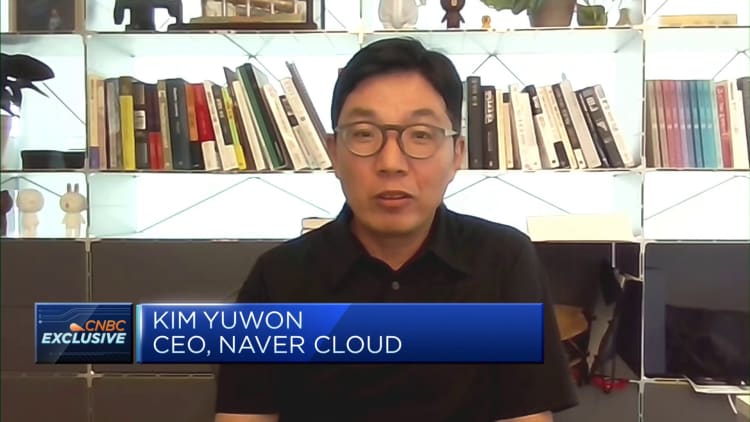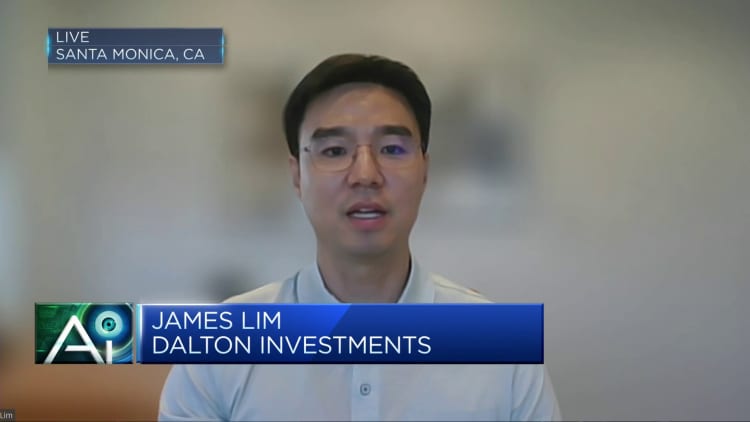
South Korean internet giant Naver released its own generative artificial intelligence tool on Thursday, joining other companies in launching large language models to compete with OpenAI’s ChatGPT.
Naver is dubbed the Google of South Korea, as the operator of the country’s top search engine. The company said its large language model HyperClova X can improve search as well as marketing and shopping experiences for advertisers and users.
HyperClova X powers a slate of new applications Naver announced Thursday including generative AI search service Cue: and chat app Clova X.
Naver said Clova X can increase work productivity by summarizing documents and running language translation. Users can also use its AI writing tool to draft emails and blog posts. Naver said Clova X will start beta testing Thursday.
“In terms of productivity, this will save 10% to 50% of time spent on those tasks,” Kim Yuwon, CEO of Naver Cloud, said in an exclusive interview with CNBC aired on Thursday.
An AI boom led by ChatGPT — the AI chatbot which has gone viral for its ability to generate humanlike responses to user prompts — has sparked clones around the world such as Microsoft’s Bard, Meta’s Llama, Alibaba’s Tongyi Qianwen and Baidu’s Ernie Bot.
“ChatGPT is a very challenging competitor. I think it’s an honest confession that we worked hard to keep up with the various abilities of ChatGPT,” said Kim.
“We tried to improve our ability to understand and respond to the intentions of the user. Korean proficiency is HyperClova’s competitive edge, but we tried to improve various language capabilities such as English to match the level of global competitors,” said Kim.
Naver’s Korea-listed shares jumped 6.03% Thursday after the announcement.
James Lim, senior research analyst at Dalton Investments, said that Naver is “still behind” other global players.
“There are really global top tier players and how do you get to a large number of parameters? First, you have to make that much of a investment and that’s where I think Naver might feel a little bit challenged because you’re going [against] the global leaders,” Lim told CNBC’s “Squawk Box Asia” on Thursday.
Naver CEO Choi Soo-yeo said that it has invested a total of 1 trillion Korean won ($756.8 million) in the last three to four years toward the research and development of AI.
Developing an AI chip with Samsung
Kim said Naver’s AI investment is “reaching the level of full-fledged commercialization” and the firm needs a “low-cost and efficient semiconductor chip to improve our service quality.”
“We’ve done the large language model artificial intelligence training but to apply it to search and shopping, the cost for this service will increase tremendously. We came to the conclusion that it would be difficult to provide quality service to our users without reducing this cost,” said Kim.
Kim said that Naver is co-developing “low-cost and efficient” AI semiconductor chips with Samsung Electronics, the world’s largest dynamic random-access memory chipmaker. SK Hynix, another South Korean DRAM chipmaker, is the second-largest DRAM chipmaker globally.
“So this is not just about further commercializing our technology. We are doing this because we think we need such a low-cost and efficient semiconductor chip to improve our service quality,” said Kim.

Naver expects to further refine and develop its generative AI model, CEO Choi said earlier this week.
“We are excited about the potential value that a generative AI-powered search, marketing and shopping experience can create for our users and advertisers,” said Choi.
“Naver has already historically showed that they can utilize the AI technology to improve their services such as increasing the efficiency of their e-commerce recommendations, and I think that will accelerate with the adoption of their more newly developed AI technology,” said Lim of Dalton Investments.